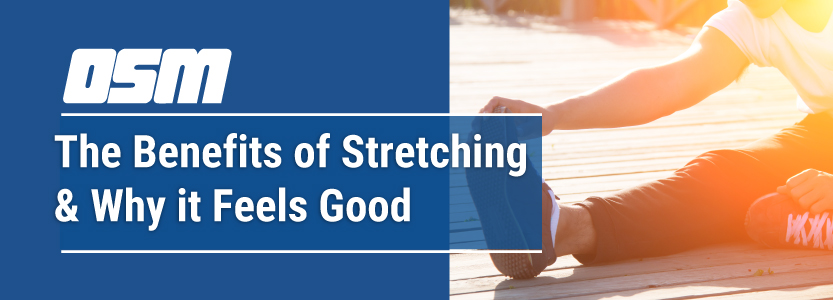The Benefits of Stretching and Why It Feels Good
Without realizing it, many of us start our day by stretching before we even get out of bed.
Involuntary stretching of your muscles is called pandiculation. It’s a behavior seen in most types of animals to relieve muscle tension.
Few activities feel better after a period of inactivity than stretching. Stretching reduces your risk of getting injured, can induce a feeling of calmness, and is even thought to improve your circulation.
In this article, we’ll help explain why stretching feels good, explore the benefits, and provide examples of simple stretches you can do on a regular basis.
Why does stretching feel good?
Humans have a natural tendency to avoid things that cause pain and to seek activities that feel good. Stretching is no exception. Your body’s natural reward system makes stretching feel good to motivate you to keep your muscles at optimal tension.
Here’s a closer look at the reasons why stretching feels good.
Improved circulation
When you stretch a muscle, your body responds by increasing blood flow to that area. The blood vessels around the targeted muscle widen to allow more blood to flow through, and your heart starts pumping more blood.
This increase in blood flow allows the muscle or muscles you’re stretching to receive more oxygen and to get rid of metabolic waste products.
Parasympathetic activation
Research has shown that static stretching activates your parasympathetic nervous system and inhibits activation of your sympathetic nervous system.
Your parasympathetic nervous system is responsible for your rest and digestion functions. It can also help induce feelings of calmness and relaxation.
Endorphin release
Endorphins are chemicals produced by your central nervous system and pituitary gland that function as neurotransmitters. They have greater pain-relieving effects than morphine and cause a feeling of euphoria when they bind with receptors in your brain.
Endorphins are part of your body’s natural reward system and are released after activities like exercise, sex, eating, and drinking.
There’s little research on the effects of stretching on endorphin release. However, according to a 2015 perspective, stretching may help reduce menstruation pain. It’s thought that its pain-relieving effects are due to the relaxation of blood vessels, the release of beta-endorphins, and the suppression of prostaglandins.
There are many benefits to stretching your muscles regularly. Let’s look at these benefits in more detail.
Increased flexibility
Regularly stretching may help improve your flexibility, especially if you live a sedentary lifestyle. Your flexibility naturally decreases as part of the aging process, but stretching may help slow down this process.
Improved circulation
Stretching causes short-term improvements in circulation by relaxing your blood vessels and increasing the amount of blood your heart pumps.
Although it’s a fairly new area of research, it’s thought that stretching may have long-term benefits on your circulatory health, such as improved blood vessel function and lower blood pressure.
Stress relief
Static stretching activates your parasympathetic nervous system. Activating this branch of your nervous system may help alleviate the psychological effects of stress. This, in turn, may help induce feelings of calmness and relaxation.
Better sports performance
Being able to achieve a full range of motion through all your joints may help boost your sports performance. For example, to achieve maximum speed, a sprinter needs to be able to fully extend and rotate their hips.
Both static and dynamic stretching may be able to help you improve your range of motion. However, static stretching should be reserved for after workouts since it can decrease force production.
Improved posture
Muscle tightness and tension can negatively affect your posture by pulling your spine into positions that can put stress on your back, neck, and core muscles.
Research has shown that regular stretching in combination with core strengthening exercises may help improve poor posture and alignment.
- Avoid stretching cold. Before you start stretching, it’s a good idea to get your blood flowing to avoid injury. Doing a low-intensity activity like walking or easy jogging for 5 minutes can help warm up your muscles.
- Stretch gently. Don’t force any position that causes pain. If a stretch is painful, it means you’re stretching too far.
- Make stretching a routine. You can reap the most benefits from stretching if it becomes a regular habit. Fitness experts recommend stretching at least two to three times per week.
- Stretch both sides. Be sure to stretch both sides of your body equally to avoid flexibility imbalances.
- Avoid bouncing. Bouncing while you’re stretching can injure your muscles or tendons. It can also make your muscle tighten.
Stretching tends to feel good because it activates your parasympathetic nervous system and increases blood flow to your muscles. It’s thought that stretching may also release endorphins that help to reduce pain and enhance your mood.
Besides feeling good and helping to relieve muscle tension and stress, stretching can also increase your flexibility and circulation, boost your athletic performance, and improve your posture.
Talk to your doctor if you have concerns about stretching, especially if you have an injury or a chronic health condition.
The Orthopedic & Sports Medicine Center of Oregon is an award-winning, board-certified orthopedic group located in downtown Portland Oregon. We utilize both surgical and nonsurgical means to treat musculoskeletal trauma, spine diseases, sports injuries, degenerative diseases, infections, tumors and congenital disorders.
Our mission is to return our patients back to pain-free mobility and full strength as quickly and painlessly as possible using both surgical and non-surgical orthopedic procedures.
Our expert physicians provide leading-edge, comprehensive care in the diagnosis and treatment of orthopedic conditions, including total joint replacement and sports medicine. We apply the latest state-of-the-art techniques in order to return our patients to their active lifestyle.
If you’re looking for compassionate, expert orthopedic surgeons in Portland Oregon, contact OSM today.
Phone:
503-224-8399
Address
1515 NW 18th Ave, 3rd Floor
Portland, OR 97209
Hours
Monday–Friday
8:00am – 4:30pm




